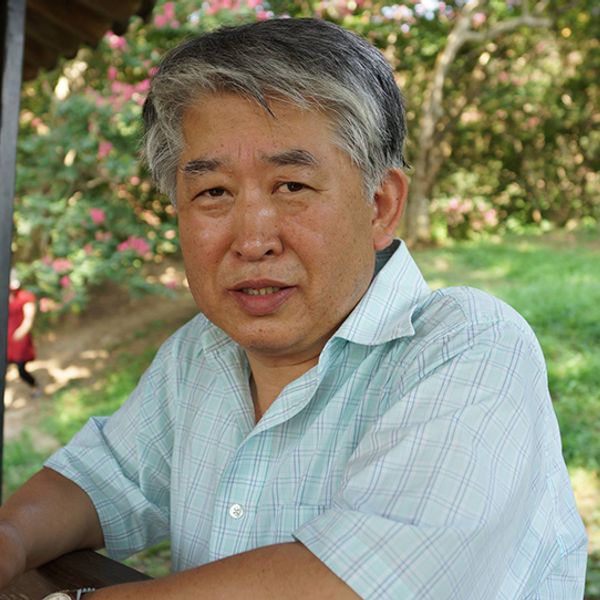Lia Purpura, Parasol Mushroom (detail), featured in AGNI 102
River Journey
Translated from the Korean by Ian Haight and T’ae-yong Hŏ
A road lines the river bank for ten li—
trampled by horses, fallen flowers perfume the way.
Do not say I fruitlessly wander near lakes and over mountains—
I have more than enough: a new poem and full silk purse.
Yi Tal was one of three chief promulgators of the T’ang style in Korean poetry. The simplicity and straightforwardness of his poetry proved a powerful influence on his students, two of whom would later be remembered as among the most important classical writers in Korean literature (Nansŏrhŏn and Kyun Hŏ). Despite his intelligence, Yi was denied any meaningful position or service because he was the son of a concubine. He spent his days wandering the Korean peninsula and visiting friends, mostly living in poverty.
Ian Haight has won Ninth Letter‘s Literary Award in Translation and has been awarded translation grants by the Daesan Foundation, the Korea Literary Translation Institute, and the Baroboin Buddhist Foundation. With T’ae-yong Hŏ, he is the translator of Borderland Roads: Selected Poems of Kyun Hŏ and Magnolia and Lotus: Selected Poems of Hyesim, finalist for the American Literary Translators Association’s Stryk Prize (both from White Pine Press). He is also the editor of Zen Questions and Answers from Korea (White Pine). His poems, essays, and translations have appeared in Barrow Street, The Writer’s Chronicle, and Prairie Schooner. (10/2016)

Yi Tal
Yi Tal (1561—1618) was one of three chief promulgators of the T’ang style in Korean poetry. The simplicity and straightforwardness of his poetry proved a powerful influence on his students, two of whom would later be remembered as among the most important classical writers in Korean literature (Nansŏrhŏn and Kyun Hŏ). Despite his intelligence, Yi was denied any meaningful position or service because he was the son of a concubine. He spent his days wandering the Korean peninsula and visiting friends, mostly living in poverty.

Ian Haight
Ian Haight is the author of the poetry collection Celadon (Unicorn Press, 2017), winner of the Unicorn Press First Book Prize. With T’ae-yong Hŏ, he has co-translated four poetry collections, including Red Rain on a Spring Mountain: Complete Poems of Nansŏrhŏn (White Pine Press, forthcoming 2024) and Homage to Green Tea by the Korean monk Ch’oŭi (White Pine, forthcoming 2023). He is also the editor of Zen Questions and Answers from Korea (White Pine). He has won Ninth Letter’s Literary Award in Translation and has been awarded translation grants by the Daesan Foundation, the Korea Literary Translation Institute, and the Baroboin Buddhist Foundation. His poems, essays, and translations have appeared in Barrow Street, AGNI Online, The Writer’s Chronicle, and Prairie Schooner. For more information visit ianhaight.com. (updated 10/2022)

T’ae-yong Hŏ
T’ae-yong Hŏ is the co-translator, with Ian Haight, of four poetry collections, including Magnolia and Lotus: Selected Poems of Hyesim (White Pine Press, 2013) and Borderland Roads: Selected Poems of Kyun Hŏ (White Pine, 2009). Working from the original hansi, Hŏ’s translations of Korean poetry have appeared in The Poetry Review (U.K.), New Orleans Review, and Atlanta Review. He has been awarded translation grants from the Daesan Foundation and the Korea Literature Translation Institute. (updated 10/2022)
